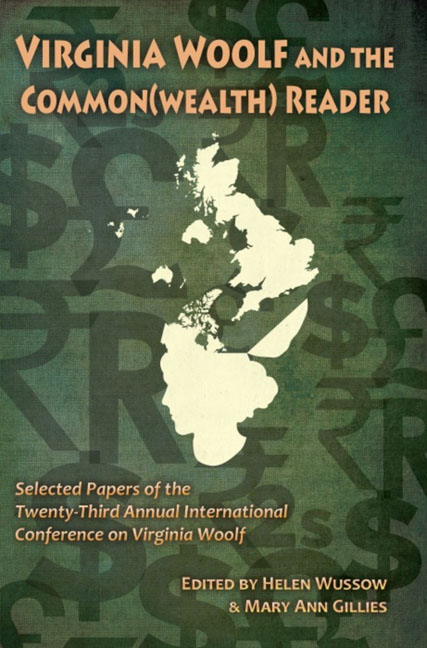Book contents
- Frontmatter
- Contents
- Introduction to Virginia Woolf and the Common(wealth) Reader
- Acknowledgments
- List of Abbreviations
- Invocations
- Networks of Affiliation: Foundations and Friends
- Education and Empire in Victorian Bloomsbury
- Synthesizing Civilizations: Leonard Woolf, the League of Nations, and the Inverse of Imperialism, 1928–1933
- James Stephen's Anti-Slavery Politics: A Woolfian Inheritance
- Networks of Empire: Virginia Woolf and the Travel Writing of Emily Eden
- Of Scrapbooks, War, and Newspapers: Leslie Stephen's Legacy
- Leslie Stephen's Science of (Ecological) Ethics
- “The Death of a Beautiful Man”: Rupert Brooke in Memory and Imagination
- Leonard Woolf and the Ceylon Civil Service: “I had come to dislike imperialism”
- Virginia Woolf in the British Commonwealth
- Woolf and the Commonwealth
- 1930s Onwards
- Woolf Beyond the Book
- Notes on Contributors
- Conference Program
Networks of Empire: Virginia Woolf and the Travel Writing of Emily Eden
from Networks of Affiliation: Foundations and Friends
- Frontmatter
- Contents
- Introduction to Virginia Woolf and the Common(wealth) Reader
- Acknowledgments
- List of Abbreviations
- Invocations
- Networks of Affiliation: Foundations and Friends
- Education and Empire in Victorian Bloomsbury
- Synthesizing Civilizations: Leonard Woolf, the League of Nations, and the Inverse of Imperialism, 1928–1933
- James Stephen's Anti-Slavery Politics: A Woolfian Inheritance
- Networks of Empire: Virginia Woolf and the Travel Writing of Emily Eden
- Of Scrapbooks, War, and Newspapers: Leslie Stephen's Legacy
- Leslie Stephen's Science of (Ecological) Ethics
- “The Death of a Beautiful Man”: Rupert Brooke in Memory and Imagination
- Leonard Woolf and the Ceylon Civil Service: “I had come to dislike imperialism”
- Virginia Woolf in the British Commonwealth
- Woolf and the Commonwealth
- 1930s Onwards
- Woolf Beyond the Book
- Notes on Contributors
- Conference Program
Summary
Virginia Woolf's writing and life were enmeshed within the networks of Empire. Even as Woolf wrote about and against Empire, she was related to it in several ways. Her husband Leonard started his career as an imperial officer, and then came to be one of the leading critics of Empire. Her paternal grandfather, the Right Honorable James Stephen, was a Counsel to the Colonial Office and Board of Trade, and Under-Secretary, to the Colonies. Her mother Julia's family, the Pattles, were members of the Anglo-Indian governing classes, and Julia was born in India. Members of the families of her close friends also worked in British colonies. Lytton Strachey's father Sir Richard Strachey served as a Lieutenant General in the colonial British armed forces. Violet Dickinson's great-aunt Emily Eden spent six years in India, from 1836-1842, with her sister Fanny and her brother George, 1st Earl of Auckland, who resided in India as a Governor-General.
It was through Dickinson that Woolf came to review Emily Eden's Letters in 1919. In a letter to Dickinson, Woolf wrote, “I think its one of the best collections for ever so long” (L 397). Eden, who lived from 1797-1869, was moderately renowned in her day as a novelist and travel writer. Like readers before her, Woolf appreciated Eden's wit, style, and vivacity. This paper will not focus on Woolf's review of the 1919 edition of Eden's Letters, but rather on Eden's Up the Country: Letters Written to Her Sister from the Upper Provinces of India (1866), her account of her travels in the Upper Provinces of India from 1837-1840. In this collection of letters we can glean a vision of the India that Woolf's Pattle ancestors would have seen, but with, perhaps, Eden's more trenchant eye.
Up the Country, as the travel writer William Dalrymple remarks, is “the most exquisitely written record of colonial disdain and hauteur to come down to us[,].…so well done that it is impossible not to laugh out loud while reading it: a guilty post-colonial pleasure.” At the same time that Eden makes her readers laugh with stories of her unhappiness during her time in India, she regales them with tales of imperialists abroad as the British Empire was nearing the height of its power.
- Type
- Chapter
- Information
- Virginia Woolf and the Common(wealth) Reader , pp. 33 - 38Publisher: Liverpool University PressPrint publication year: 2014



